 Petzlover
Petzlover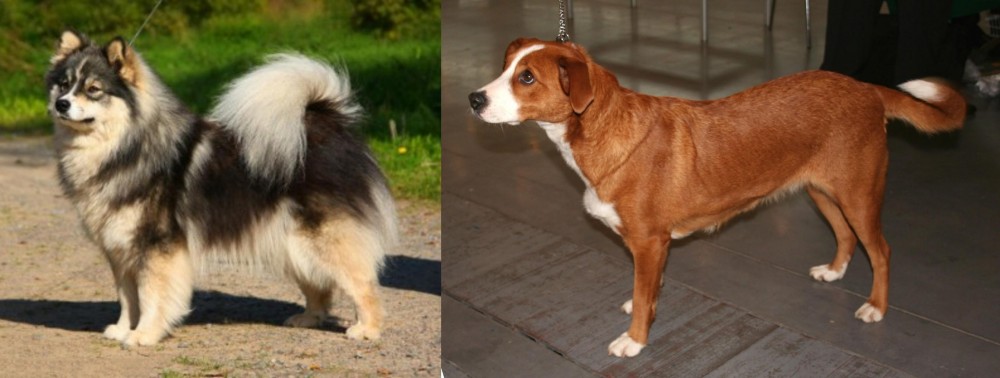 Finnish Lapphund is originated from Finland but Osterreichischer Kurzhaariger Pinscher is originated from Austria. Both Finnish Lapphund and Osterreichischer Kurzhaariger Pinscher are having almost same height. Both Finnish Lapphund and Osterreichischer Kurzhaariger Pinscher are having almost same weight. Both Finnish Lapphund and Osterreichischer Kurzhaariger Pinscher has same life span. Both Finnish Lapphund and Osterreichischer Kurzhaariger Pinscher has almost same litter size. Both Finnish Lapphund and Osterreichischer Kurzhaariger Pinscher requires Moderate Maintenance.
Finnish Lapphund is originated from Finland but Osterreichischer Kurzhaariger Pinscher is originated from Austria. Both Finnish Lapphund and Osterreichischer Kurzhaariger Pinscher are having almost same height. Both Finnish Lapphund and Osterreichischer Kurzhaariger Pinscher are having almost same weight. Both Finnish Lapphund and Osterreichischer Kurzhaariger Pinscher has same life span. Both Finnish Lapphund and Osterreichischer Kurzhaariger Pinscher has almost same litter size. Both Finnish Lapphund and Osterreichischer Kurzhaariger Pinscher requires Moderate Maintenance.
 Known also as the Lapinkoira, Lapponian Shepherd Dog or Finish Lapland Dog, it is believed that the Finnish Lapphund is an ancient dog breed, dating back way back to 7000 B.C.
Known also as the Lapinkoira, Lapponian Shepherd Dog or Finish Lapland Dog, it is believed that the Finnish Lapphund is an ancient dog breed, dating back way back to 7000 B.C.
The breed had its origins as a reindeer herder with the Sami people, being both herder and protector. In Finland, the first breed standards for the dog were set in 1945 by the Finnish Kennel Club. They called the dog the Lappish Herder.
The first American litter was born in 1988 and it was in 1994 that the breed was recognized by the United Kennel Club, becoming a recognized breed in the Herding Group in 2011.
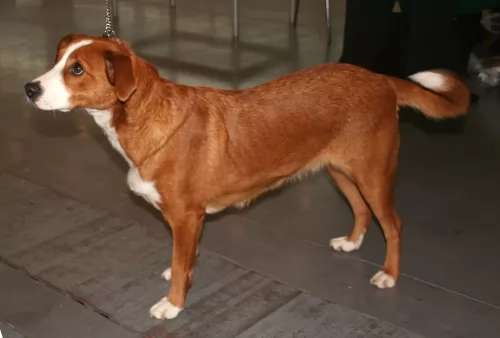 Hailing from Austria, the Osterreichischer Kurzhaariger Pinscher, better known as the Austrian Short-Haired Pinscher has always been depicted on paintings from the Baroque period.
Hailing from Austria, the Osterreichischer Kurzhaariger Pinscher, better known as the Austrian Short-Haired Pinscher has always been depicted on paintings from the Baroque period.
The dog is a terrier-type canine and has always been used as a watchdog but he was also used to hunt because of the terrier qualities he possesses.
This dog has always been used for working on farms. Breeding of this dog started in 1921 and the dog was recognized by the United Kennel Club in 2006.
 Looking quite a bit like the Samoyed, Siberian Husky or Australian Shepherd, the Finnish Lapphund stands at between 40 and 52cm and weighing 15 to 24kg.
Looking quite a bit like the Samoyed, Siberian Husky or Australian Shepherd, the Finnish Lapphund stands at between 40 and 52cm and weighing 15 to 24kg.
The Finnish Lapphund is a medium sized dog with a friendly, sweet face.He has a beautiful soft cuddly kind of coat that is medium to long in length and essentially straight. The dense undercoat provides insulation and shouldn’t be trimmed.The dog comes in different colors such as tan brown, yellowish and black. The ears are erect and the tail is bushy, curling over the back.
One characteristic of this dog which can irritate some people is that he has a tendency to bark. This characteristic of his makes him a good watch dog though. He is a friendly dog who wants to do the right thing, and training and socialization can ensure that he is always obedient and amicable.
Intelligent and alert, your pet is an intelligent dog and training him won’t prove to be difficult.It is a dog which craves companionship from his human family and he wants to be included in all his family’s activities. He wants to accompany you on all your running- and cycling activities. He gets on well with children in the home with his gentle nature, being a particularly friendly breed.
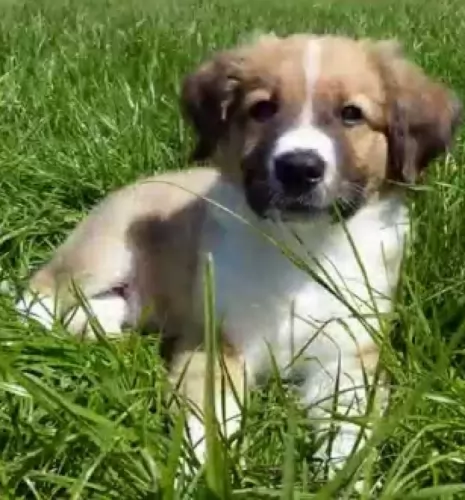 As a medium sized dog, both males and females stand at between 42 and 50cm in height and the dog weighs roughly between 14 and 20kg.
As a medium sized dog, both males and females stand at between 42 and 50cm in height and the dog weighs roughly between 14 and 20kg.
The coat is shortish, dense and smooth and is essentially black and tan with some white, fawn or brindle. The ears of the dog are fairly short and they look as though they wanted to be erect but then decided to be floppy. The nose is black and the eyes dark brown.
The tail is usually docked but when it is left long, it curls over the back. If you want your dog to be bred you can expect between 4 – 6 puppies.
These are playful dogs, getting on well with their human families and wanting to get involved in their activities. They are suspicious of strangers. They are good with kids, making them a good playmate, but they don’t like small children being allowed to climb over them.
They are able to get along well with any other pets in the house. It would be to your benefit to have the dog trained and socialized as he becomes obedient and good around people in social settings. He is an intelligent dog and will find training easy.
They also take their role as guardian and protector seriously.Because he was bred to be a farm dog, he wouldn’t e able to adapt to life on a tiny property in the city.
 The Finnish Lapphund is an active and alert dog who just loves to fuss around his human family. He has many good qualities that make him the perfect family pet. It is why he is often referred to as an all-rounder.
The Finnish Lapphund is an active and alert dog who just loves to fuss around his human family. He has many good qualities that make him the perfect family pet. It is why he is often referred to as an all-rounder.
He is a calm, friendly non-aggressive dog who wants to be co-operative with his owners. He has the tendency to bark. With a friendly, happy face, he is essentially just a big teddy bear and if you treat him well he is going to make sure that he showers you with his special love and loyalty.
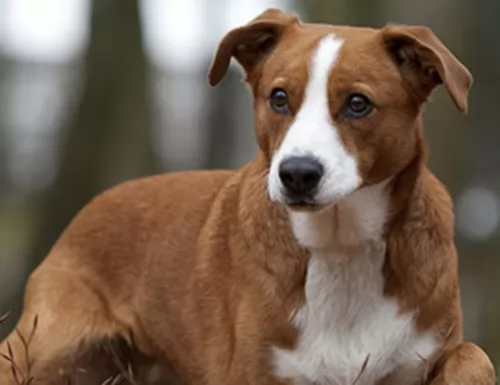 Have your Osterreichischer Kurzhaariger Pinscher trained and socialized if you want him to be amicable and obedient around you and your visitors.
Have your Osterreichischer Kurzhaariger Pinscher trained and socialized if you want him to be amicable and obedient around you and your visitors.
He does well with a human family who are firm, kind and patient with him. He loves to be kept busy with both mental and physical exercise, thriving on challenging activities, and he will become frustrated if he is left day after day just to lie around.
Take him with you on walks, buy him nice chewy, stimulating toys, throw a ball or frisbee with him and include him in your activities.
This is a dog more suited to life in the countryside as opposed to life in the city. Care well for this splendid family pet and you’ll quickly begin to see why dogs like him are known as man’s best friend.
 Regarded as generally healthy, the Finnish Lapphund can reach anything between 12 and 14 years of age. There are however one or two common dog illnesses that your Finnish Lapphund might be more prone to and these are hip and elbow dysplasia as well as progressive retinal atrophy.
Regarded as generally healthy, the Finnish Lapphund can reach anything between 12 and 14 years of age. There are however one or two common dog illnesses that your Finnish Lapphund might be more prone to and these are hip and elbow dysplasia as well as progressive retinal atrophy.
While the occurrences of these illnesses is rare, they can happen with your Finnish Lapphund. Whenever you notice something untoward with your pet, get him to the vet immediately.
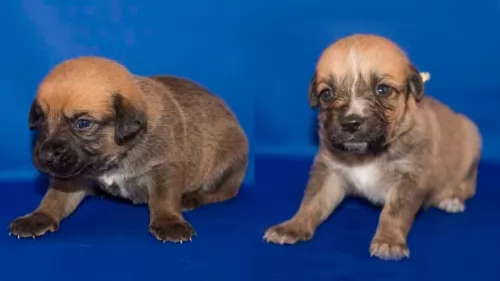 The Austrian Short-haired Pinscher is a robust kind of dog that isn’t going to have you rushing to the vet very often. True, he does have some hereditary health issues but it is highly unlikely that you will find these health issues in your pet.
The Austrian Short-haired Pinscher is a robust kind of dog that isn’t going to have you rushing to the vet very often. True, he does have some hereditary health issues but it is highly unlikely that you will find these health issues in your pet.
Nonetheless it pays to know about one of the more serious conditions -
This is a heart disease that is present from birth and could have been passed down from the parent dog to the puppy. A congenital heart defect occurs as a malformation of any valve, with the most common congenital heart diseases in dogs being patent ductus arteriosus, pulmonic stenosis as well as subaortic stenosis, all potentially inherited defects.
Sometimes a dog can live a fairly normal life with this disease but other times there are complications which can lead to congestive heart failure and atrial fibrillation, causing symptoms such as difficulty with breathing, cough and weakness. Your dog will need to get to the vet to discuss treatment options.
 With his beautiful, thick coat the Finnish Lapphund sheds quite heavily during certain seasons. The double coat will certainly require a good brushing at least twice a week to remove dirt, burrs and grass.
With his beautiful, thick coat the Finnish Lapphund sheds quite heavily during certain seasons. The double coat will certainly require a good brushing at least twice a week to remove dirt, burrs and grass.
All dogs deserve a high quality dog food which is appropriate to the breed, the age of the dog, his size and his activity levels.
You want to ensure that your pet gets all the right vitamins and minerals he requires for good health. If you aren’t sure what to feed your pet on, speak to your vet. Home-made food is always a good idea too as it provides some variety to your pet’s diet. Cooked rice, vegetables and chicken becomes a tasty, nutritious treat when added into his kibble. Also try to add in some raw meat when you can as well to ensure his skin and coat remain healthy. Cool, fresh water is to be supplied night and day non-stop.
Your Finnish Lapphund isn’t the kind of dog who is going to be bounding around you demanding exercise. He is a calm dog with moderate exercise requirements. He will love to join you on a walk every day and some ball games will satisfy him.
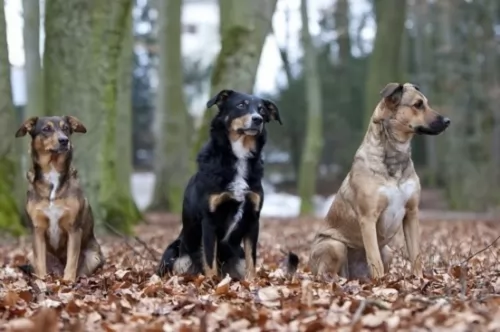 They need quite a lot of exercise, and even though they can adopt to life in the countryside or the city, they will require regular walks, ball- and rope games to prevent them becoming bored, frustrated and destructive.
They need quite a lot of exercise, and even though they can adopt to life in the countryside or the city, they will require regular walks, ball- and rope games to prevent them becoming bored, frustrated and destructive.
The Austrian Short-haired Pinscher sheds quite a bit so he will need to be brushed at least twice a week to remove the loose hairs.
As a medium sized, energetic dog, you want to ensure you maintain your dogs energetic nature by providing him with excellent food.
Choose your commercially manufactured food carefully as some of them are of a poor quality and can actually be detrimental to your dog’s health. Choose a high quality kibble that has quality ingredients.
Home-made food such as boiled chicken, brown rice or pasta and vegetables such as carrots, spinach and sweet potatoes all chopped up and added to his kibble occasionally will do wonders for this dog. He will thrive on also getting in some raw meat from time to time.
Ensure a constant supply of fresh, cool water.